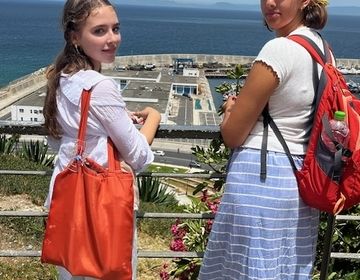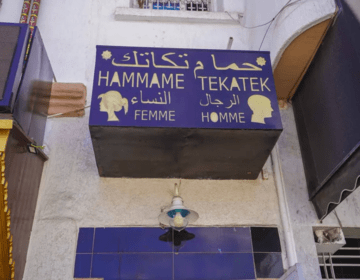Student Post: Alex Nelson
This post was written by Alex Nelson. The views and opinions expressed in this blog are those of the author and do not necessarily reflect those of CIEE.
There are many aspects to the Moroccan experience. One of them is the food. But there are many others that are extremely important, so I thought that’d I’d give a crash course in Moroccan food while drawing parallels to the Moroccan experience.
At every almost every meal, there’s bread. Bread, or LHobbs, is an essential part of the Moroccan diet. Each person gets their own section of bread which they use to eat the food. To me, this bread represents American individualism. Each person gets their own bread. And while this is something that we can try to lose, it will always be a part of us.
One of the most delicious delicacies in Morocco is the cous cous. Every Friday, families dig in to a scrumptious bowl of cous cous, meat and vegetables. To me, this represents many things - collectivism, family, sharing. The cous cous is emblematic of the Moroccan experience, it shows how Moroccans interact with each other through the medium of food.
Finally, the tajin. The tajin is the pinnacle of Moroccan cooking. When families bring out the tajin, you know you’ve hit the jackpot. The tajin is a clay dish with a lid that’s used to hold hot meals for everyone to share. Normally, the tajin holds some sort of meat. The lid to the tajin represents that which holds us back - the desire to remain in our comfort zones, clinging to our individualistic ideals, and fear of change. But once that is removed, one can see the juicy, tasty, scrumptious meal that is the Moroccan culture and people.
Although the food here is different, it really brings us closer to our host families. It’s a great way for all of us to better connect with the culture and the people of Morocco because so many of their values are reflected in the way that they eat. One of the most memorable things about Morocco is how willing everyone is to share and help one another. The lack of materialism is striking - personal relationships trump all other prior commitments and that can be seen in every corner of Moroccan life. Whether it’s the “greetings” that last longer than the average American conversation, or your host mother offering you slippers so you don’t get your feet dirty, or the people that stop and talk to us every day to help us practice Arabic, you come to realize that the relationships you can form with time and effort will long outlast anything that you can buy with money.
Related Posts
Weekend in Marrakesh
Our Weekend in Marrakesh - This blog was written by one of our students - Nyx Lange Reflecting on our past weekend excursion to Marrakesh from our Moroccan base of... keep reading

Exploring Tangier: A Day in Morocco's Gateway to Africa
This past weekend, our group ventured to the north of Morocco to the vibrant city of Tangier where the Mediterranean Sea meets the Atlantic Ocean First, we met our guide... keep reading

Bssaha wa Raha L'hammam🚰🪣🧼 بالصحة و الراحة الحمام
By Program Leader, Mohsin: Hey everyone! As your Moroccan program leader, I’m thrilled to introduce you to one of our country’s most cherished traditions: the hammam. If you’ve never heard... keep reading
